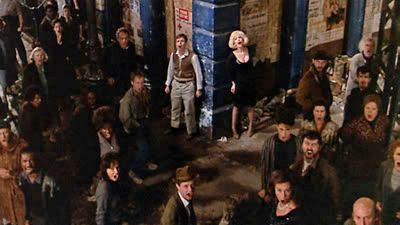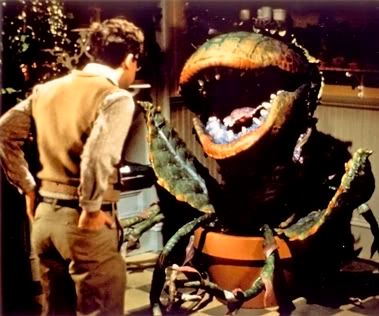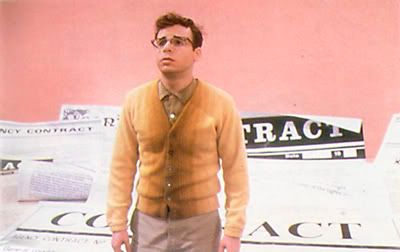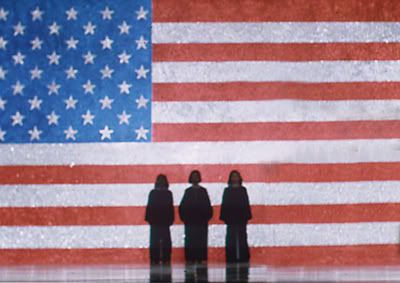Like Romeo and Juliet, Seymour and Audrey are soulmates kept apart by circumstance. The aching divide between them is beautifully pictured at the start of the film. At the end of the "Downtown (Skid Row)" number, the pair sing the same lines, though separated in space. They both stop on a street corner, but on different sides of the same building - the corner of which neatly cuts the frame in two. Thus joined in song and spirit but divided by their material situation, they look to the sky and plead for a change in their dead-end lives. Wrapped up in their own miseries, they never even notice (too busy singing?) that the objects of their affections are, literally, right around the corner.
Drab reality keeps Audrey and Seymour from realizing that they are meant for one another. Seymour pines away for Audrey, and watches with jealous resentment as she leaves work early ("I got a date," she winces) and comes in late ("Not that we’ve had a customer," Mushnik sighs) to date the despicable dentist. When Mushnik criticizes her romantic choices, she replies, "He’s a rebel, Mr. Mushnik, but he makes good money. Besides, he’s the only fella I got." Seymour’s heart visibly breaks - we can see he’s just longing to shout out that no, she has him – but how can he compete with the flashy dentist, with his leather jacket and motorbike? Churchmouse-poor, what does he have to offer, other than his love? Little does he know that all he has to do is declare himself and Audrey would gladly ditch the greaser.
Seymour feels so inadequate that even when his plant brings success to the shop, he can’t conceive that a girl like Audrey could want him. Even though he sees the sweet girl beneath, he is so dazzled by her superficial glamour, he can't imagine she'd want a schlub like him. When she offers to help him pick out some new clothes, he gapes, "You’d be seen with me in a public place like a department store?" Bashfully, she agrees – but not tonight. She’s got a date.
In her heart Audrey knows that Seymour is the kind of guy she wants and needs, but her fear of the dentist and her innate insecurities stop her. "I don’t even deserve a sweet, considerate, suddenly successful guy like Seymour," she tells Ronette, Crystal and Chiffon. Then, in the privacy of her tiny flat, she opens up a Better Homes and Gardens magazine and imagines herself and Seymour living in suburban bliss between its pages. Sighing over the gleaming appliances and well-manicured lawns, she wistfully sings of life "Somewhere That’s Green." The song, and charming cartoon-like fantasy sequence that goes with it, is hilarious, skewering every dreadful cliché of tract-house living – Tupperware parties, TV dinners, and "plastic on the furniture to keep it neat and clean / In the Pine-Sol scented air somewhere that’s green."
The talent and wit of Ashman and Menken, Frank Oz, and especially Ellen Greene prevent this sequence from becoming a snide put-down of Audrey’s dreams. Though we chuckle at her fantasy home’s tacky décor we never feel superior to Audrey as a person. Despite her peroxide exterior, Ellen Greene's Audrey is a sweet, simple, fragile soul, and the performance is touchingly sincere for what could be a totally clichéd character. Faced with a grim life of cold-water flats, bums on the sidewalk, and a flashy, rich, but abusive boyfriend, who wouldn’t want to flee to the suburbs? In her fantasy, Seymour even sports an un-glamorous but reassuringly normal pot-belly.
The tragedy is that, like Seymour, Audrey defines happiness by what she’s seen on TV and read in magazines, and feels that someone from her poor circumstance and less than Ivory-pure background could never have something as simple as love. The fantasy is so much better than her reality, it drives her to date the awful dentist, who at least "makes good money" and practices in a gleaming deco office on 5th Avenue. A poor girl from the slums, Audrey feels lucky to have even this tenuous security, and takes the beatings as the trade-off. In "Suddenly Seymour" she hints at a life of desperation: "Nobody ever treated me kindly / Daddy left early, Mamma was poor / I’d meet a man and I’d follow him blindly / He’d snap his fingers, and me, I’d say ‘sure.’"
Into this void appears the Audrey II, with a slick line of patter and a talent for attracting a different kind of "green." Audrey II embodies the ever-hungry maw of capitalism, spreading its tendrils far and wide, and luring the unwary to their doom by appealing to every base instinct. Like a TV pitch man, it makes even the most repellent prospects seem attractive, and like a credit card company, it offers the world on a platter - but with interest paid in blood. Once Seymour realizes how much debt he's in, the very thing he worked so hard for - Audrey - is rudely repossessed.
Audrey II turns on the charm.
Audrey II's pernicious aura of greed and gluttony engulfs even those who know nothing of its true nature. Orin accidentally kills himself by overdosing on the laughing gas he sniffed for kicks. Mushnik meets his demise because he lets his mercantile instincts over-ride his moral sense: he saw Seymour chopping up the dentist’s body, and reasonably assumed that Seymour murdered him. Threatening to turn him in, he blackmails Seymour to learn the secret of the plant’s growth and hence, the fortune in publicity that comes with it. Too late, Mushnik learns Seymour's true secret and is swallowed whole.
With the situation rapidly spinning out of control, Seymour decides to elope with Audrey after one last TV appearance, after which they can take the money and run. The need to appease Audrey II for one more payday, rather than immediate flight, dooms the couple in the original version, but only provides a dramatic climax in the release prints. As seem by the American public in 1986, Audrey and Seymour escape skid row with Seymour's newly-inflated bank account, and never again troubled by the bloody sacrifices Seymour has made. Certainly a more palatable conclusion in the midst of the go-go 80's, but one seriously lacking in moral weight or dramatic unity.
Seymour contemplates signing his soul away for fame, fortune and love.
Instead, we are left to contemplate what might have been - how a man from "International Licensing and Marketing" sets the stage for the end of the world. The Audrey II is a potent symbol of greed, of hunger for anything and everything except true spiritual happiness. Like Romero's ravenous zombies, Audrey II is the ultimate "consumer," and inspires a compulsive avarice. In the deleted ending, thousands flock to buy their very own Audrey II, in a frenzied fad like hula-hoops or pet rocks. Mindless commercialism and corporate amorality (one can imagine the indigent population near Audrey II factories mysteriously dwindling) bring about the downfall of America – visualized by the climactic shot of a cackling plant smothering the Statue of Liberty in its vines. Innocent commodities have turned deadly; consumers have become the consumed, and America is engulfed in an apocalyptic bonfire of the vanities.
Friday, February 22, 2008
LITTLE SHOP - The Root of All Evil
Money and possessions - or the lack thereof - play a crucial role in Little Shop of Horrors, and forms the basis of its central metaphor. Most of the characters are poor, downtrodden souls dreaming of a better life – one dangled in front of their faces by the movies and TV, but always tantalizingly out of reach. Though the film never kids itself - after all, who doesn't want money and a safe, secure life? - this desperation for "the good life" drives Seymour and Audrey to sacrifice their principles and self-respect, leaving them open to exploitation by the evil alien plant. After the jump, more about the cash-poor tragedy of life down on skid row and how changing the ending undercut this tale of upward mobility gone bad.
Subscribe to:
Post Comments (Atom)

No comments:
Post a Comment